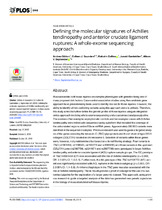| dc.contributor.author | Gibbon, Andrea | |
| dc.contributor.author | Saunders, Colleen J. | |
| dc.contributor.author | Collins, Malcolm | |
| dc.contributor.author | Gamieldien, Junaid | |
| dc.contributor.author | September, Alison V. | |
| dc.date.accessioned | 2018-11-05T07:05:20Z | |
| dc.date.available | 2018-11-05T07:05:20Z | |
| dc.date.issued | 2018 | |
| dc.identifier.citation | Gibbon, A. et al. (2018). Defining the molecular signatures of Achilles tendinopathy and anterior cruciate ligament ruptures: A whole-exome sequencing approach. PLoS ONE, 13(10): e0205860. | en_US |
| dc.identifier.issn | 1932-6203 | |
| dc.identifier.uri | https://doi.org/10.1371/journal. pone.0205860 | |
| dc.identifier.uri | http://hdl.handle.net/10566/4179 | |
| dc.description.abstract | Musculoskeletal soft tissue injuries are complex phenotypes with genetics being one of
many proposed risk factors. Case-control association studies using the candidate gene
approach have predominately been used to identify risk loci for these injuries. However, the
ability to identify all risk conferring variants using this approach alone is unlikely. Therefore,
this study aimed to further define the genetic profile of these injuries using an integrated
omics approach involving whole exome sequencing and a customised analyses pipeline.
The exomes of ten exemplar asymptomatic controls and ten exemplar cases with Achilles
tendinopathy were individually sequenced using a platform that included the coverage of
the untranslated regions and miRBase miRNA genes. Approximately 200 000 variants were
identified in the sequenced samples. Previous research was used to guide a targeted analysis
of the genes encoding the tenascin-C (TNC) glycoprotein and the α1 chain of type XXVII
collagen (COL27A1) located on chromosome 9. Selection of variants within these genes
were; however, not predetermined but based on a tiered filtering strategy. Four variants in
TNC (rs1061494, rs1138545, rs2104772 and rs1061495) and three variants in the upstream
COL27A1 gene (rs2567706, rs2241671 and rs2567705) were genotyped in larger Achilles
tendinopathy and anterior cruciate ligament (ACL) rupture sample groups. The CC genotype
of TNC rs1061494 (C/T) was associated with the risk of Achilles tendinopathy (p = 0.018,
OR: 2.5 95% CI: 1.2–5.1). Furthermore, the AA genotype of the TNC rs2104772 (A/T) variant
was significantly associated with ACL ruptures in the female subgroup (p = 0.035, OR:
2.3 95% CI: 1.1–5.5). An inferred haplotype in the TNC gene was also associated with the
risk of Achilles tendinopathy. These results provide a proof of concept for the use of a customised
pipeline for the exploration of a larger genomic dataset. This approach, using previous
research to guide a targeted analysis of the data has generated new genetic signatures
in the biology of musculoskeletal soft tissue injuries. | en_US |
| dc.language.iso | en | en_US |
| dc.publisher | Public Library of Science | en_US |
| dc.rights | © 2018 Gibbon et al. This is an open
access article distributed under the terms of the
Creative Commons Attribution License, which
permits unrestricted use, distribution, and
reproduction in any medium, provided the original
author and source are credited. | |
| dc.subject | Musculoskeletal soft tissue injuries | en_US |
| dc.subject | Complex phenotypes | en_US |
| dc.subject | Genetic profile | en_US |
| dc.subject | miRBase miRNA genes | en_US |
| dc.title | Defining the molecular signatures of Achilles tendinopathy and anterior cruciate ligament ruptures: A whole-exome sequencing approach | en_US |
| dc.type | Article | en_US |
| dc.privacy.showsubmitter | FALSE | |
| dc.status.ispeerreviewed | TRUE | |
| dc.description.accreditation | ISI | |

